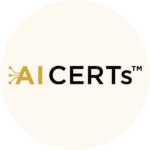
AI CERTS
5 months ago
Become an AI Security Compliance Expert-
As artificial intelligence (AI) continues to revolutionize industries, the need for robust security and regulatory compliance has become more critical than ever. AI systems have immense power to automate processes, analyze vast data sets, and make decisions. However, with these capabilities come increased risks, including data breaches, misuse of AI models, and non-compliance with data privacy laws. The growing importance of ethical and secure AI deployment has led to a rising demand for professionals who can become AI security compliance experts. These individuals ensure that AI systems are both secure and compliant with local, national, and international regulations.
In this article, we will explore the path to becoming an AI security compliance expert, the responsibilities of the role, key regulatory frameworks, and why this expertise is vital in today's AI-driven world.

Why AI Security Compliance Matters
AI systems are becoming more integrated into critical sectors such as healthcare, finance, education, and law enforcement. As these systems become more pervasive, the need to ensure that they are secure, transparent, and compliant with regulatory requirements grows exponentially. AI security compliance ensures that AI systems are built and deployed in ways that protect user data, maintain ethical standards, and follow legal mandates.
Several recent scandals—such as privacy breaches in social media, biased AI algorithms in law enforcement, and misuse of AI-generated data—have highlighted the need for stronger AI governance. Compliance experts help bridge the gap between AI innovation and regulatory frameworks, ensuring responsible and lawful use of AI technologies.
Key Responsibilities of an AI Security Compliance Expert
Becoming an AI security compliance expert involves more than just understanding AI technologies; it requires knowledge of cybersecurity, legal frameworks, and industry-specific regulations. Below are the key responsibilities of professionals in this role:
1. Ensuring Data Privacy and Security
AI systems often rely on massive datasets that include sensitive user information. An AI security compliance expert ensures that AI systems collect, store, and process data in compliance with regulations such as the General Data Protection Regulation (GDPR) and the California Consumer Privacy Act (CCPA).This includes implementing data encryption, anonymization techniques, and secure storage solutions to prevent data breaches.
2. Mitigating AI Bias and Ensuring Fairness
One of the key ethical concerns surrounding AI is algorithmic bias, which can lead to unfair treatment of individuals based on race, gender, or other characteristics. Compliance experts mitigate bias by conducting regular audits of AI models, ensuring training on diverse and representative datasets, and implementing measures to identify and correct biases.
3. Regulatory Compliance
AI security compliance experts must ensure that AI systems comply with the specific regulations governing their industry. For example, in healthcare, AI systems must comply with HIPAA (Health Insurance Portability and Accountability Act), while AI systems in finance must adhere to SOX (Sarbanes-Oxley Act) and PCI DSS (Payment Card Industry Data Security Standard).
4. AI Governance and Risk Management
AI governance establishes policies, procedures, and frameworks to ensure the responsible development, deployment, and monitoring of AI systems.This includes performing regular risk assessments to identify vulnerabilities and implementing policies that mitigate potential risks.
Related Reading: Explore how bias in AI can affect compliance in Harvard Business Review’s article on AI Fairness Isn’t Just an Ethical Issue
Key Regulations and Frameworks for AI Security Compliance
Professionals looking to become AI security compliance experts must be familiar with the regulatory frameworks that govern AI development and use. These regulations ensure that AI systems operate securely, transparently, and ethically.
1. General Data Protection Regulation (GDPR)
GDPR is a comprehensive data protection law in the European Union that governs how personal data is collected, processed, and stored. Under GDPR, AI systems must ensure the protection of personal data and provide individuals with rights over their data, including the right to access, correct, and delete personal information. Compliance with GDPR is crucial for any AI system handling personal data in Europe.
2. California Consumer Privacy Act (CCPA)
The CCPA is similar to GDPR but applies to businesses operating in California. It grants consumers the right to know what personal data is being collected, request its deletion, and opt out of the sale of their data. AI systems handling personal information in California must comply with CCPA’s strict data protection and transparency requirements.
3. Health Insurance Portability and Accountability Act (HIPAA)
HIPAA is a key regulation governing the use of AI in healthcare. AI systems that process health data must adhere to HIPAA’s stringent privacy and security rules, ensuring that sensitive patient data is protected from breaches or unauthorized access.
4. NIST AI Risk Management Framework
The National Institute of Standards and Technology (NIST) has developed an AI risk management framework to help organizations govern the ethical and secure use of AI. This framework provides guidelines on how to assess and mitigate risks in AI systems, ensuring that they are transparent, fair, and secure.
5. Proposed EU AI Act
The European Union’s proposed AI Act aims to regulate AI technologies according to their level of risk. High-risk AI systems, such as those used in healthcare and law enforcement, will face stricter regulatory scrutiny. As the EU AI Act comes into effect, compliance experts will need to ensure that their AI systems meet these new regulatory standards.
External Resource: For more information on the EU’s AI regulatory initiatives, visit European Commission’s AI regulation page.

How to Become an AI Security Compliance Expert
Becoming an AI security compliance expert requires a mix of technical, legal, and ethical knowledge. Here are the steps you can take to achieve this career:
1. Gain Expertise in AI and Machine Learning
Start by building a strong foundation in AI and machine learning. Understanding how AI models are built, trained, and deployed is crucial for identifying their security vulnerabilities and ensuring compliance with regulations. Learning AI basics can help you better grasp how these systems interact with data and security measures can be applied effectively.
2. Study Cybersecurity Fundamentals
AI security compliance requires a solid understanding of cybersecurity principles. Learn how to protect AI systems from cyberattacks, data breaches, and adversarial threats. Key areas of focus include encryption, secure data storage, and network security.
3. Familiarize Yourself with Relevant Regulations
To ensure AI compliance, you must stay updated on current laws and regulations affecting AI technologies. Make sure to study data privacy laws such as GDPR and CCPA, industry-specific regulations like HIPAA for healthcare and PCI DSS for finance.
4. Learn AI Ethics
Ethical AI is a major concern for regulators, and understanding the ethical implications of AI use is crucial for compliance experts. AI security compliance experts need to ensure that their systems are fair, unbiased, and transparent in their decision-making processes.
5. Obtain Certifications and Specialized Training
Gaining certifications in both AI and cybersecurity will demonstrate your knowledge and enhance your credentials. Look for programs that cover AI ethics, data security, and regulatory compliance to broaden your expertise.
Related Reading: For additional insights , read Forbes’ article on AI Is The Future Of Hiring, But Humans Play The Most Important Role
The Future of AI Security Compliance Expert
As AI continues to expand into new industries, the demand for AI security compliance experts will only grow. Governments are increasingly recognizing the need to regulate AI technologies, leading to the development of new laws and guidelines that require compliance. Professionals who specialize in AI security and compliance will play a critical role in ensuring that AI systems are both ethical and secure.
As AI systems become more complex, the need for constant monitoring, risk assessments, and ethical audits will increase. Those who become AI security compliance experts will be well-positioned to address these challenges, ensuring that AI technologies benefit society while adhering to legal and ethical standards.